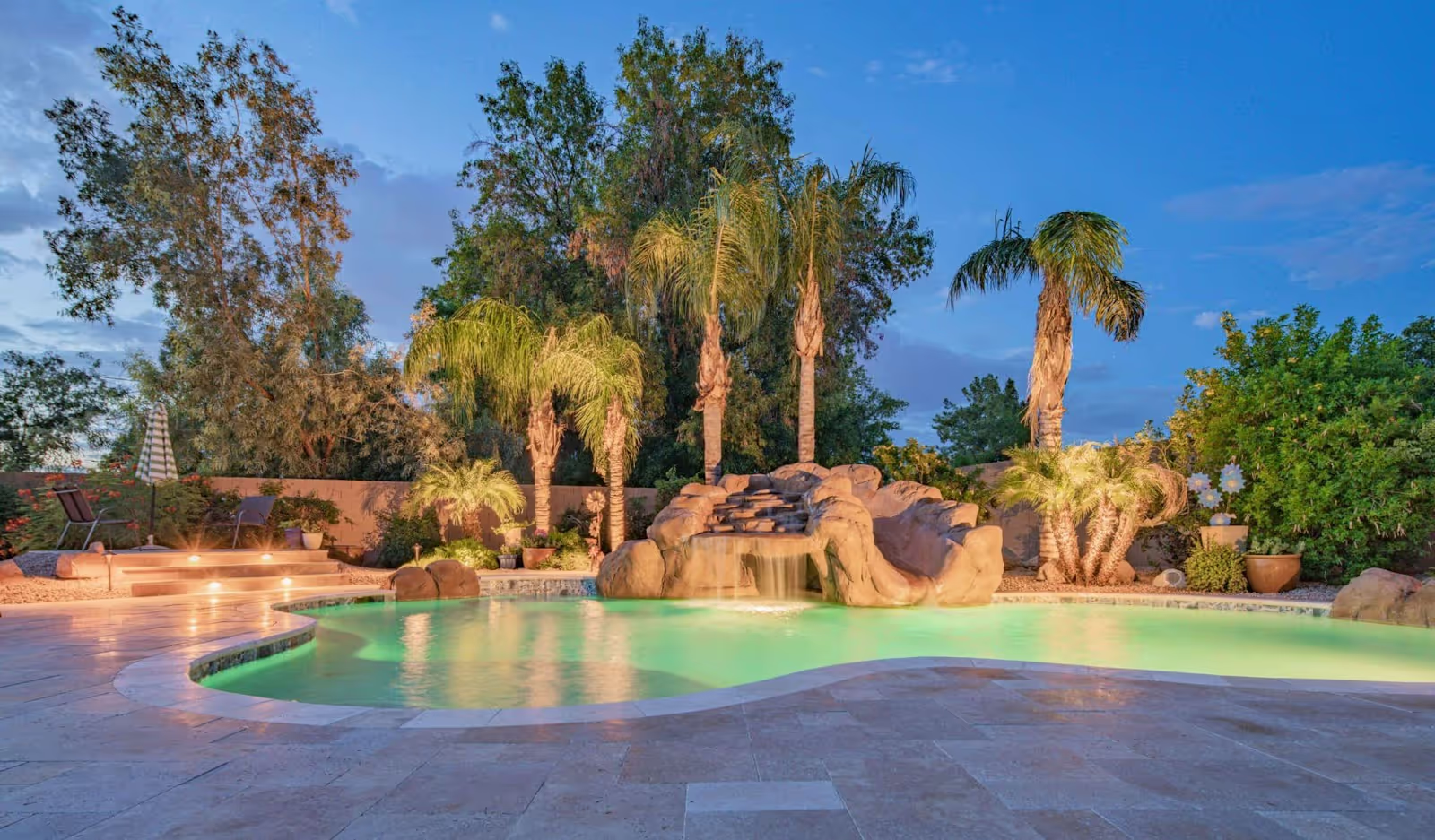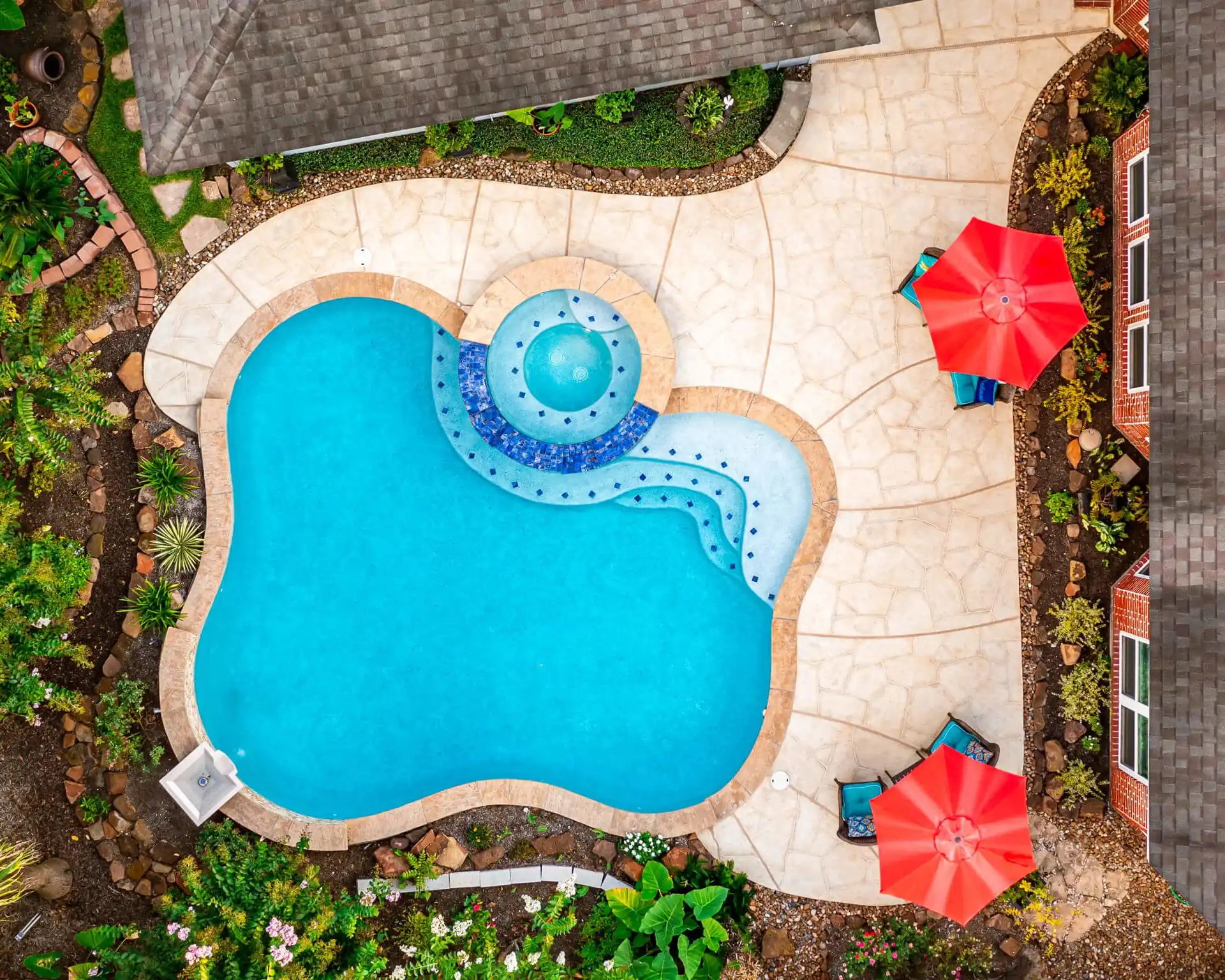Best Poolside Decking Materials for Texas Homes
Our poolside decking material rankings are based on 5,000+ Texas pool deck installations. Discover the best premium deck material for your inground pool.

A good pool deck material somewhere else may not be a great poolside decking material in Texas. That’s not just us being “homers” — our state’s blend of high humidity, shifting soil and UV exposure means Texas pool decks must be built tougher.
So how do you get a pool deck that’s tough enough to handle Texas summer, and still beautiful enough to create the outdoor living space of your dreams?
We used decades of experience (and thousands of pool deck installations) to pick 6 ideal decking material options for your inground pool. We’ve installed these materials with confidence in Austin, Houston, San Antonio and DFW — and we’d love to do the same for you.
- Texas homeowners must use locally-based decision points. Expansive clay soil presents pool deck foundation challenges. High heat and moisture affects porous materials, and creates mildew and chlorine damage issues.
- We rated the six best poolside decking materials for Texas homes. Consider modified concrete, natural stone, concrete pavers, travertine, porcelain tile and brick.
- Natural wood and composite aren’t ideal for local pool decks. Local heat, humidity and moisture concerns cause warping, cracking, heat and UV damage.
Poolside Decking: 3 Lone Star State Decision Points

Whether it’s unstable clay soil shifting your pool deck’s foundation or Houston’s brutal humidity causing moisture issues, Texas has unique environmental challenges for decking installation.
The added heat and humidity in our region also increase the risk of chlorine damage to your pool deck.
Let’s look at the key decision points Texas homeowners must consider when selecting the best material for their poolside decking.
Make the most of your backyard. Start with a complimentary design consultation.
Pool Decking and Texas Clay Soil
Expansive clay soil in Texas retains a ton of moisture. That causes the soil to swell, settle and shift in rainy or dry conditions — you’ve probably noticed puddles and cracks in your yard.
Stability is a key factor for pool deck materials and their foundation. Make sure your deck rests on a solid, properly installed foundation to avoid shifting, wobbly stones and cracks.
Ask your pool deck contractor about effective drainage solutions. Ensure the pool deck and surrounding area are sloped away from the pool and the house. This allows water to naturally flow away from the structure.
Channel drains and deck drains are excellent options to direct surface water away from your poolside area. Integrate drains into your deck’s surface to collect and divert rain water.
Can Your Decking Handle the Humidity?
Constant exposure to humidity wreaks havoc on porous pool decks. Increased moisture in the air causes untreated stone surfaces to crack, and wood decks to warp and swell.
Houston is a hotbed for poolside humidity concerns. It creates an ideal environment for mold and mildew growth — this discolors and stains your pool deck, and weakens its structural integrity.
Choose moisture, mold and mildew-resistant decking to combat humid climates.
Texas Pool Decking and Chlorine Resistance
Chlorine is crucial to safe swimming pool water. It also causes problems on untreated pool deck surfaces.
High heat and moisture leads to faster chemical reactions between chlorinated water and your pool decking materials. Pool water that splashes on your decking evaporates, leaving dissolved chlorine in its place.
Dissolved chlorine corrodes and damages deck surfaces. Natural wood, untreated concrete and flagstone (especially limestone) are susceptible to corrosive condensation.
Not sure where to start? Explore our stunning patio and pool deck project gallery.
Best Texas Pool Decking Materials: Dive Into Pros and Cons
Allied Outdoor Solutions asked our team of expert pool deck designers and contractors for insights on the most reliable pool decking materials for Texas homeowners.
We used data from over 5,000 installation projects to inform our research. Then, we paired that data with the local decision points listed above to create our list of the best Texas pool decking materials, along with their specific pros and cons.
We based our final decisions on the following criteria:
- Durability
- Safety
- Aesthetics (style)
- Comfort
- Heat resistance
- Moisture resistance
- Chlorine resistance
Modified Concrete (Carvestone)

Modified concrete provides excellent resistance to heat and moisture, plus a strong rating in independent pressure testing.
Our builders trust Carvestone, a premium concrete overlay supplier that provides boundless customization to mimic colors, textures and styles.
Carvestone emulates the natural beauty of flagstone, brick and other natural stone — while offering greater resistance to chlorine and moisture. It also withstands nearly twice as much pressure as standard concrete.
Seal your Carvestone pool deck every 2 years for peak performance.
Pros:
- Extremely durable
- 5,000+ PSI pressure rated
- Heat resistant (especially with light colors)
- Non-slip surface when properly textured
- Moisture resistant
- Chlorine resistant
- Aesthetic versatility
Cons:
- Qualified installation is required
- Untextured surfaces can be slippery when wet
- Higher cost than other materials
Need more design inspiration? Check out our Carvestone project gallery!
Texas Flagstone

The aesthetic beauty of natural stone is unmatched in outdoor living spaces. Texas flagstone materials, like limestone and sandstone, come in a rich variety of cream, tan, buff, brown, gray and reddish colors.
Natural stone is durable and heat-resistant. It stays cool under your feet, even in the hot summer months.
Texas flagstone is locally quarried and easily sourced without expensive delivery costs. It’s often available at a lower price point than most other premium pool decking materials.
Be sure to properly seal and maintain a natural stone poolside deck. Unsealed stone is naturally porous and susceptible to moisture absorption and chlorine damage over time.
Pros:
- Unrivaled beauty and style
- Locally sourced
- Rich variety of colors and patterns
- Heat resistant
- Non-slip surface
- Competitive price point (from local quarries)
Cons:
- Must be rigorously sealed and maintained
- Subject to moisture and mildew when unsealed
- Subject to chlorine damage when unsealed
Concrete Pavers and Tile

Concrete pavers and tile are cost-effective alternatives to modified concrete overlay materials. Homeowners derive all the strength and durability of concrete, but sacrifice some aesthetic versatility and customization.
Properly sealed concrete pavers are moisture-resistant and offer good protection against heat damage. A concrete foundation also provides excellent stability to combat shifting clay soil.
Textured pavers are crucial for Texas pool decks to prevent slips and falls. Quality installation and maintenance are necessary to prevent uneven grout and grout staining.
Pros:
- Extremely durable
- Strong foundation support
- Heat resistant
- Moisture resistant (when properly sealed)
- Good color and texture customization options
Cons:
- Less customizable than modified concrete (especially patterns)
- Untextured concrete is slippery when wet
- Poor installation creates uneven grout and cracking issues
Travertine

Travertine is a gorgeous natural stone that looks great around inground swimming pools. A form of limestone, it blends nicely with the natural sedimentary rock formations in Texas landscapes.
A major benefit of travertine is its high heat resistance. It’s formed by mineral deposits in hot springs, so it naturally performs well in hot climates. Its natural porosity also helps with drainage away from your poolside area.
Travertine’s highly porous nature does have drawbacks as well. Regular sealing and cleaning is required to mitigate the impact of chlorine and moisture damage. This is especially important in humid regions like Houston and the Gulf Coast.
Pros:
- High aesthetic beauty
- Excellent heat resistance
- Rich colors, textures and patterns
- Luxury design appeal
- Natural drainage properties
Cons:
- Frequent sealing and cleaning necessary
- Moisture and chlorine damage (when untreated)
- Higher sourcing cost than other natural stone materials
Design a space you’ll never want to leave. Book your free design consultation today!
Porcelain Tile

The same features that make porcelain tile a great pool resurfacing material make it a good decking option. It’s extremely durable and water-resistant, providing good protection against moisture damage.
Porcelain tile stays cool underfoot, even in hot temperatures. It comes in a wide variety of colors, styles and sizes, making pool deck design simple.
These premium design features come with a higher price tag than some other materials. Porcelain is also slippery when wet unless specifically textured — ask your installer about non-slip strategies for porcelain tile pool decking.
Pros:
- Gorgeous, premium aesthetics
- Natural water resistance
- Moisture resistant
- Heat resistant
- Versatile color and style options
Cons:
- High price point vs. other materials
- Slippery when wet (unless textured)
- Requires expert installation
Brick Pavers

Brick and brick pavers are a strong choice for pool owners who want a low-maintenance, durable pool deck. They work well in rustic and traditional outdoor design spaces.
You won’t have to worry about brick’s durability against chlorinated water. Proper, expert installation is crucial — a solid foundation, well-compacted base and sealant are essential to safeguard your brick against moisture.
The biggest drawback of brick pool decking is its relatively low resistance to heat versus other premium materials. Grout can also be challenging to properly maintain, as it’s less resistant to chlorine than brick itself.
Pros:
- Relatively low maintenance
- Natural rustic charm
- Durable
- Versatile color and style options
- Chlorine resistant (brick)
Cons:
- Grout is challenging to maintain vs. moisture and chlorine
- Proper foundation is crucial to performance
- Low resistance to heat
- Lower natural resistance to moisture (sealant necessary)
Other Pool Deck Materials That Didn’t Make Our List
Wood and composite are two popular pool deck materials that didn’t quite make our list of premium options. Each material has some benefits, but also some significant downsides that Texas pool owners need to consider.
Wood
Treated wood is beautiful, and it works fine on some pool decks in other regions of the country. But Texas isn’t the best place to use wood pool decking.
The combination of Texas humidity and persistent chlorine exposure puts too great a strain on premium hardwoods. You’ll seal and stain your deck more often than you’d like, and you’ll still be at risk for painful foot splinters.
The price tag of beautiful hardwoods like Ipe and redwood is too high for the burden of increased maintenance and visible chlorine and heat damage.
Composite
Composite pool decking is an affordable, relatively durable solution that offers good moisture resistance.
What it can’t offer is a truly elevated design look. Composite never really mimics natural materials, and many homeowners comment on its “artificial” look and feel.
Composite decking also has surprisingly low heat tolerance — it gets quite hot underfoot during the summer. Persistent UV exposure in areas like San Antonio also leads to fading.
Premium Texas Pool Deck Installation: Start Here

It takes a little extra to be a premium poolside decking material in Texas. You need strong foundations to stabilize clay soil, durable materials that resist heat and moisture damage, plus the aesthetic beauty to enhance your curb appeal.
Our design experts and contractors have transformed over 20,000 backyards into premium outdoor living spaces in Austin, Houston, San Antonio and Dallas-Fort Worth. Homeowners trust us for our custom craftsmanship, material expertise, and personalized attention.
Deciding between pool deck materials? We’d love to lend a hand — reach out for some friendly, no-hassle advice!
Lorem Ipsum has been the industry's standard dummy text. Lorem Ipsum is simply dummy text of the printing and typesetting industry.
Lorem ipsum dolor sit amet, consectetur adipiscing elit. Suspendisse varius enim in eros elementum tristique. Duis cursus, mi quis viverra ornare, eros dolor interdum nulla, ut commodo diam libero vitae erat. Aenean faucibus nibh et justo cursus id rutrum lorem imperdiet. Nunc ut sem vitae risus tristique posuere.



.svg)

.svg)



.svg)





